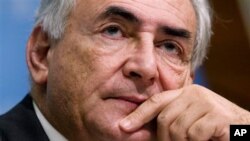JUBA, SOUTH SUDAN —
South Sudan has the potential to become an economic powerhouse in Africa if the government pursues the right policies, former International Monetary Fund chief, Dominique Straus Kahn, said Tuesday during a visit to the world's newest nation.
“I do believe that there is a lot to do here," Strauss-Kahn said.
"The country has a lot of natural resources and so the possibility for this country to become one of the strong countries among African countries is for me... a challenge that is possible to win.”
Strauss-Kahn was in Juba to inaugurate a new bank, the National Credit Bank, nearly two years after he resigned from the IMF amid a widely publicized sex scandal that ended his IMF and political career.
Gaining independence at a time of global economic crisis, as South Sudan did, is not easy, Strauss-Kahn said, but he insisted that. with right economic policies, the country will prosper.
The "right economic policies" were, he implied, allowing free market forces to work.
"The temptation to go through a state-owned company and for having the state putting its fingers everywhere is something which is very difficult to face,” he said.
Despite being endowed with abundant natural resources, South Sudan remains one of the poorest countries on the African continent with around four million of the population of 10 million still living in poverty, the National Bureau of Statistics says.
Strauss-Kahn said that for South Sudan to realize its economic potential, the country needs to attract foreign direct investment and develop the South Sudanese "brand."
"Many people just don’t know that you have here your own republic, which is only about two years old," he said.
"So... just explaining to the rest of the world that you have here about 10 million people with a lot of resources and that you want to develop and that there are a lot of opportunities for business is something that has to be done.”
He also warned against an over-reliance on oil for revenues, as is currently the case in South Sudan.
"When 95 percent or 98 percent of your resources comes from oil, it is very difficult to say that you are going to diversify rapidly," Strauss-Kahn said.
"Nevertheless, it has to be done, especially in the direction of agriculture because the problem of food security is certainly a problem here."
The Governor of South Sudan’s Central Bank, Kornelyo Koriom, said South Sudan is doing everything it can to improve the investment climate in the country to attract business.
Strauss-Kahn, a one-time French presidential hopeful and former head of the IMF resigned from his post after a hotel maid in New York accused him of sexual assault in May 2011.
US prosecutors eventually dropped criminal charges against Strauss-Kahn, saying Nafissatou Diallo, the maid, was not a credible witness.
“I do believe that there is a lot to do here," Strauss-Kahn said.
"The country has a lot of natural resources and so the possibility for this country to become one of the strong countries among African countries is for me... a challenge that is possible to win.”
Strauss-Kahn was in Juba to inaugurate a new bank, the National Credit Bank, nearly two years after he resigned from the IMF amid a widely publicized sex scandal that ended his IMF and political career.
Gaining independence at a time of global economic crisis, as South Sudan did, is not easy, Strauss-Kahn said, but he insisted that. with right economic policies, the country will prosper.
The "right economic policies" were, he implied, allowing free market forces to work.
"The temptation to go through a state-owned company and for having the state putting its fingers everywhere is something which is very difficult to face,” he said.
Despite being endowed with abundant natural resources, South Sudan remains one of the poorest countries on the African continent with around four million of the population of 10 million still living in poverty, the National Bureau of Statistics says.
Strauss-Kahn said that for South Sudan to realize its economic potential, the country needs to attract foreign direct investment and develop the South Sudanese "brand."
"Many people just don’t know that you have here your own republic, which is only about two years old," he said.
"So... just explaining to the rest of the world that you have here about 10 million people with a lot of resources and that you want to develop and that there are a lot of opportunities for business is something that has to be done.”
He also warned against an over-reliance on oil for revenues, as is currently the case in South Sudan.
"When 95 percent or 98 percent of your resources comes from oil, it is very difficult to say that you are going to diversify rapidly," Strauss-Kahn said.
"Nevertheless, it has to be done, especially in the direction of agriculture because the problem of food security is certainly a problem here."
The Governor of South Sudan’s Central Bank, Kornelyo Koriom, said South Sudan is doing everything it can to improve the investment climate in the country to attract business.
Strauss-Kahn, a one-time French presidential hopeful and former head of the IMF resigned from his post after a hotel maid in New York accused him of sexual assault in May 2011.
US prosecutors eventually dropped criminal charges against Strauss-Kahn, saying Nafissatou Diallo, the maid, was not a credible witness.




